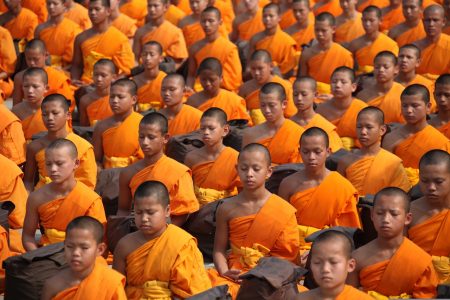- Save the species, don’t have kids. Seems counterproductive but who are we to argue?
Many religions around the world have institutions comparable to monks and nuns. A crucial part of these traditions is denying yourself some basic aspects of human life — like having children, or sex in general.
But there’s also one issue — having sex and producing children is a basic aspect of human and, frankly, all life. Because of this, people who study sociology and other related have for a long time struggled with one question.
Why do we do it? Why do some people decide to devote themselves to chastity?
Of course, you can’t discount the religious convictions of these people, nor are we trying to. But strictly evolutionarily speaking, you’d imagine that refusing to produce offspring is bad for the species.
Now, a new study has found that celibacy has a positive evolutionary effect. But that comes with some caveats, one of which is particularly strange — it will never benefit the celibate person themselves.
So, how does this all work? Let’s take a closer look.

A Monastic Tradition
The celibacy study was carried out by Ruth Mace, a professor of anthropology, and Alberto Micheletti, a research fellow from University College London. For the study, they interviewed and observed 530 households from 21 western Chinese villages, situated on the eastern Tibetan Plateau.
The residents of the villages are Amdo Tibetans, a people that subsists mostly by raising herds of yaks and goats and farming small plots. Until recent years, there’s also been a tradition of sending one son from each family to a monastery to live as a monk.
Up to one in every seven boys in the area ends up becoming a monk. As part of their vows, the Buddhist monks swear to not engage in horizontal mambo.
The region, therefore, was a good place for Mace and Micheletti’s team to research celibacy’s effect on humanity and society. The locals almost unanimously stated that they sent their sons to the monasteries simply because of religious beliefs and traditions.
But the study revealed that may be another reason as well — even if the locals themselves may not realize it.
Celibacy Equals Cash Money — For Your Big Brother
Before we go any further, do note that it’s not our intention — nor Mace’s and Micheletti’s — to discount anyone’s religious feelings. This whole thing is strictly about looking at things through the lens of science and evolution.
So, first of all, the Amdo Tibetan society is fairly strictly patriarchal. The eldest son inherits most the family’s wealth, with the next sons in line each getting less and less.
Since the eldest son is the main heir of the family, they never go to the monasteries. Instead, it’s one of their youngest siblings that becomes a monk.
Mace and Micheletti found that local men who had a monk brother were richer than those who didn’t. They owned more yaks and land and could benefit from the resulting abundant resources.
Additionally, the researchers observed that men with a celibate monk brother had more children. Consequently, grandparents with a monk son also tended to have more grandchildren than those who didn’t.
Clearly, the son sent off to the monastery doesn’t benefit in evolutionary terms — he never gets to carry on his genes. But his oldest brother, on the other hand, seems to gain quite a bit from the deal.
Why is that, though? Is the eldest son trying to make up for the kids his little brother will never have?
Fewer Mouths to Feed
According to Mace and Micheletti, this pattern of eldest sons with celibate brothers becoming richer hints that celibacy is not just an arbitrary concept. In fact, it may have evolved by natural selection.
Consider this — let’s say that there are five eligible bachelors in a village, but only four ladies. The guys would probably get into serious competition trying to woo a bride for themselves.
But what if one of them goes off to the monastery? Well, would you look at that? Suddenly there’s no more need to fight over girls.
So, the group clearly benefits from some men becoming monks. There’s less need to compete over limited inheritance and marriage rights. Instead, the couples that do get married can concentrate on producing more children, thanks to having more wealth themselves.
There’s just one issue in this model — young men aren’t likely to choose to become celibate. After all, they themselves have nothing to gain from it.
“Therefore, celibacy shouldn’t evolve,” the study authors wrote in The Conversation.
And this is where the science gets a bit cynical. See, it’s not the youngest son’s choice to become a monk. His parents and other villagers make that choice for him.
Sure, they will cite religious reasons. But from a purely evolutionary point of view, it’s simply a matter of eliminating competition within the group.
It’s doubtful the parents themselves view the whole thing in these kinds of ruthlessly calculating terms. But according to Mace and Micheletti, this is a likely reason why humans came up with monks and nuns in the first place.
Essentially, the celibate son takes one for the team. But hey, at least he gets a shot at finding inner peace in the monastery.
Hits: 0












